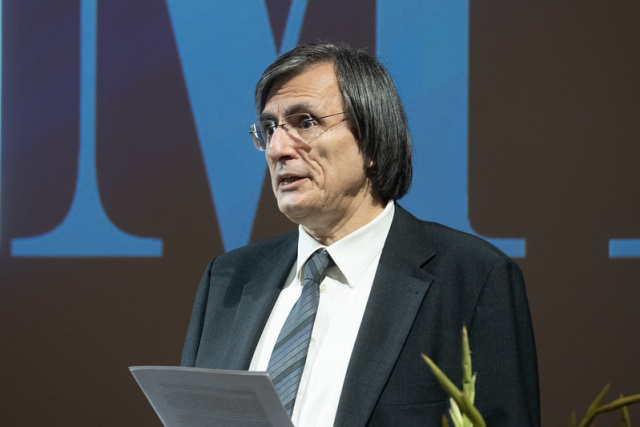The Hungarian Academy of Sciences at 200: academy presidents from around the world visit Budapest to celebrate and collaborate on the morning of day two of the conference
The Hungarian Academy of Sciences is celebrating its 200th anniversary. The third day of November marked the beginning of several days of bicentennial programmes in Hungary’s capital, where leaders from numerous scientific academies and scientific organisations around the world gathered to help MTA celebrate. As part of the celebrations, an international conference was held on 4 November entitled The Past, Present and Future of Learned Societies: The Changing Role of Academies in the 21st Century.
The conference was opened by Gábor Kecskeméti, Chair of the MTA200 Presidium Committee, who spoke about the special role played by the Academy in the life of the Hungarian nation.
He recalled the circumstances surrounding its founding, noting that the Hungarian Academy of Sciences was established through public fundraising. He emphasised that
MTA played a key role in shaping Hungarian national identity, culture and scientific life, as well as in the development of modern civil society as early as the 19th century.
In her keynote speech, Enikő Bollobás discussed further aspects of Hungarian history, highlighting the role of Count István Széchenyi, who, also inspired by his father’s philanthropy, offered one year’s income from his estates to found the Hungarian Learned Society, which inspired his fellow aristocrats to join and donate similar amounts to this cause. She highlighted the hardships scientists have faced at various periods in Hungarian history, noting their persistence after the bloodshed of the 1848 Hungarian Revolution and during the pain of Soviet occupation.
 Enikő Bollobás Photo: mta.hu / Tamás Szigeti
Enikő Bollobás Photo: mta.hu / Tamás SzigetiIn his address, MTA President Tamás Freund reflected on the Academy’s history of perseverance through political and social upheavals, noting how its independence and integrity have endured since its foundation. He mentioned that, despite the difficult separation of the Academy from its research network in 2019, a comprehensive strategy to reinforce MTA’s role as Hungary’s principal scientific institution has been implemented, noting a shift of focus from being a research-performing organisation to a research-funding organisation and a learned society with unique representative power via its
19,000 strong public association.
President Freund continued by outlining reforms designed to strengthen ties with researchers and society. These include the MTA Centres of Excellence, which recognise outstanding research institutions, and the Hungarian Young Academy, which amplifies the voice of early-career scientists. The Academy has expanded its strategic research programmes – ranging from sustainability and brain science to the Hungarian language and education – and conducted a landmark national survey of nearly 5,000 researchers to assess the state of Hungarian science. Other MTA programmes include Bolyai Fellowships, Momentum (Lendület) grants, the National Brain Research Programme, cooperation with early career researchers, as well as support for women in science.
 Tamás Freund Photo: mta.hu / Tamás Szigeti
Tamás Freund Photo: mta.hu / Tamás SzigetiReconnecting science with the public has been central to MTA’s renewal, according to President Freund. The Hungarian Science Festival now reaches hundreds of thousands of viewers online, while the High School Alumni Programme brings scientists into classrooms across the country. New initiatives, such as the Science and Art events and the Movement of Science-Friendly Cities, highlight the Academy’s commitment to bridging research, culture and everyday life.
President Freund noted the renovated Academy Palace, reopened for the bicentenary, stands as a symbol of continuity and transformation. Exhibitions, publications and international partnerships will continue through 2026, underscoring MTA’s evolving mission.
“Our traditions must be complemented by agility, cooperation and openness,”
President Freund said, capturing the spirit of an Academy entering its third century with confidence and purpose.
After a classical music performance and short picture film on the history of MTA, the second half of the morning continued with Professor László Kollár’s keynote address, emphasising that academies must have a clear vision for the future and that science policy involves serving society through representing scientists, upholding research integrity, fostering international collaboration, and safeguarding academic freedom, among other responsibilities.
 László Kollár Photo: mta.hu / Tamás Szigeti
László Kollár Photo: mta.hu / Tamás SzigetiHe stressed that science must stick to facts rather than simplify matters for political expediency, and that uncertainty is acceptable while transparency is paramount.
Short speeches were then given by Radomir Pánek, President of the Czech Academy of Sciences, Distinguished Professor Dame Jane Harding, President of the New Zealand Academy of Sciences (the Royal Society Te Apārangi), Wim van Saarloos, President of EASAC, and Bernadette Kun, Co-Chair of the Hungarian Young Academy. This was followed by a roundtable moderated by Professor Kollár, in which Boldizsár Szentgáli-Tóth, Co-Chair of the Hungarian Young Academy, joined the first three speakers in talking about issues such as ageing memberships in academies, the responsibility of academies and ensuring diversity.

